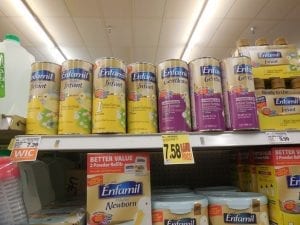Breastfeeding is the best formula for babies. The American Academy of Pediatrics emphasizes to importance and benefits of breastmilk formula, which contains a unique set of nutrients and good bacteria that are all important to your child’s gut health and is yet to be replicated by even the most expensive baby formula in the market. There are different kinds of formula for babies according to their needs.

However, some women cannot breastfeed their infants due to different reasons. Science has since addressed this problem. Today, there is no shortage of powdered formula options. These powdered formula alternatives provide a viable and nutritious solution, ensuring that infants receive essential nutrients even when breastfeeding is not possible.
The best formulas for infants can ensure that babies still get the adequate nourishment they need (read more about it here). Let’s take a look at some of the benefits:
- Offers a practical feeding option, allowing flexibility and involvement of other caregivers.
- Enables precise measurement and control of the baby’s milk consumption.
- A practical solution if parents return to work, ensuring continued nutritional support.
- Necessary in cases where breastfeeding is contraindicated due to health issues.
- Available to address specific health concerns or dietary needs, such as allergies.
However, with so many options marketed as “perfect” formulas and so many brands claiming they have the line of products, choosing the formula for your infants can be overwhelming. So, how do you make sure you get the right milk formula? Here is everything you need to know about baby formulas.
Finding The Best Formula To Newborn Babies
First off, it is important to note that there is no single best formula for all babies, as different babies react to different kinds of milk formula differently. This includes even those baby formulas for constipation, which may work well for some babies but cause discomfort and intolerance in others. Others may react better to certain types and brands, while some may experience discomfort and intolerance. Others may react better to certain types and brands, while others may experience discomfort and intolerance.
There are various baby kinds of milk formula sold on the market, including European formulas, but the only milk formulas you should try are the ones accredited or prescribed by experts and trusted formula companies, as not all formula can be the best for your baby. Likewise, there a milk to help babies gain weight. As they grow, you can ask your doctor about kid’s vitamins for weight gain. If your baby is having discomfort because of the build-up of gas in his body, you may try the baby formula for gas. Also, note that since the pandemic started, a significant milk formula shortage has been observed. These shortages can be attributed to supply issues and recalls because of potential contamination.

Understanding Formulas: The Different Types Of Best Newborn Formula And Infant Formula
With that said, while there are countless formula brands, products, and many different variants in the market, it is important to know that there are only a few different baby formulas out there, and they all differ from the base material of the milk formula and their intended use.
Knowing more about the baby’s formula can be overwhelming, especially with so many formula brands marketed to parents these days. The best baby formula might vary from one infant to another, especially when considering specific needs like a formula allergy. Some parents are drawn to the organic baby formula Earth’s, while others might consider soy formula as a viable alternative. Infants with sensitive digestive systems are frequently advised to use the extensively hydrolyzed formula. Amidst various formula choices, the Advantage Premium Infant Formula stands out as a popular option among the infant formulas marketed. While many parents are equipped to prepare baby formula at home, it’s essential to determine if a homemade baby formula is safe and meets the nutritional requirements that most formulas offer. Some might even ponder the decision to switch baby formulas based on their baby’s specific needs and preferences.
- Baby milk options: Limited types available, each differing in base materials and purposes.
- Overwhelming market: Countless brands and products make choosing daunting.
- Varied needs: Best milk varies by infant, considering allergies and sensitivities.
- Options: Organic, soy, and extensively hydrolyzed milk caters to different needs.
- Popular choice: Advantage Premium Infant milk stands out among marketed options.
- Homemade milk: Consider safety and nutritional adequacy before opting for homemade versions.
- Switching milk: Parents may contemplate changing based on infant’s needs and preferences.
Many milk formula brands are designed to be hypoallergenic, and some contain proteins that are hydrolyzed to ease digestion.
Cow’s Milk Based
Cow’s milk is derived from the milk of the cow. They have been altered to resemble breastmilk as closely as possible. Cow’s milk proteins are broken down and modified to make them easier to digest. Plus, they are also iron fortified formula to address to iron needs of the baby. This type is most common in the United States.
Most cow’s milk formulas are sufficient (read more about it here: https://www.babylist.com/hello-baby/best-baby-formula).
Some babies, due to taste, religious, or cultural preferences, are also given milk based on goat milk formula or soy milk.
Soy-Based
Soy formula types, made from soy protein, provide a suitable alternative to cow’s milk, benefiting babies with lactose intolerance or allergic reactions to cow’s milk protein. However, it is important to note that some babies may be allergic to soy baby formula as well. Thus, it is important to consult with your pediatrician before switching.
Specialized
Specialty baby formula, simply known as specialized milk formula, is specifically designed to give babies certain nutrients or assist with specific feeding or health issues. While some parents might consider if homemade baby formula is safe, these specialized formulas often derive from sources other than human breast milk. They might be crafted from grass-fed cows or formulated without certain vegetable oils, like soy oil, that could trigger sensitivities. Cow’s milk allergy commonly concerns parents, prompting them to choose alternatives to whole formula.
Several Benefits Of Specialized Milk
The liquid concentrate version of these formulas eases the preparation of the formula, offering added convenience to some caregivers. Pediatricians frequently recommend these alternatives to address cow’s milk allergies, sensitivities, gastrointestinal problems, malabsorption, and other related conditions in infants. Many of these formulas are specifically designed to support brain development, distinguishing them from traditional formula types. Ultimately, the right feeding formula is crucial for the baby’s health and growth.
Extensively Hydrolyzed
The Extensively hydrolyzed baby milk formula is specifically designed for babies with protein allergies to cow’s milk. The formula milk proteins in this milk formula are broken into even smaller pieces to make the milk formula easier to digest and absorb.
Human Milk Oligosaccharide (HMO)
This milk comes with complex sugars that are found in breast milk. The Food and Drug Administration (FDA) considers this milk formula to benefit gut health, which is vital for the baby’s immune system development.
Hypoallergenic Formula
As its name suggests, this is a gentle formula designed for babies with severe allergies to cow’s milk protein. This formula is generally made up of amino acids, the building blocks of proteins. Thus, they are easy to digest as well.
Finally, all baby formula contain added ingredients to closely mimic breast milk for its nutritional profile. Aside from the ones made in the US, there are also European formulas, which some consumers prefer. European baby formula follows European regulations when it comes to ingredients to include in their milk formula. Thus, European milk formulas are known to contain certified organic milk and natural components. Also, European formulas are non-GMO. One of them could be the recommended formula for colic babies.

Milk For Babies With Immature Digestive And Immune Systems
Despite the many types of baby milk or varieties, not all baby milk suits those babies who still have relatively immature digestive and immune systems. As proper nutrition is critical for the first few months of life outside the womb, first-stage milk is preferred for infants. These milk formulas contain low levels of casein, the protein in milk that comes out during curdling. Lowering levels of this protein helps prevent dangerous interactions with the baby’s sensitive stomach.
First-stage formula milks also have nutrient levels that more closely mimic those found in breast milk to support mental health, proper growth, and brain and eye development.
Newborn Babies Formula: What Formula Experts Best Recommend To A Newborn
One of the most popular baby formula brands is Enfamil EnfaCare Infant Formula, which has a higher nutritional value than other regular baby milk formula brands. It also has significant amounts of DHA and ARA, which are omega-3 fatty acids that play a role in maintaining brain and eye health. These two nutrients are useful for babies, whose nervous systems are still developing at a rapid pace.

Another popular choice is Similac Neosure Infant Formula, which also has a higher amount of vitamins including vitamin D, minerals, and other nutrients, compared to different milks. This formula for baby sold on the market specializes in delivering Vitamin E, which has antioxidant and protective properties, and lutein, which helps in eye health. The question on the minds of many mothers is “Enfamil baby milk better than Similac?” Enfamil and Similac have their own unique formulations and variations, each designed to cater to different aspects of infant nutrition. Like Enfamil EnfaCare, this product also has high levels of DHA and ARA.
Organic Baby Formula
Besides conventional baby formula, Earth’s Organic baby formula is also recommended by pediatricians. This product is derived from milk products that do not contain artificial growth hormones or antibiotics and is exclusively made of organic ingredients.
Organic baby formula, often regarded as the best formula for all newly born, is increasingly popular, including varieties that contain human milk oligosaccharides, similar to breast milk, and those that are among the infant formulas sold in Europe, known as European baby formulas, which sometimes include partially hydrolyzed formulas for easier digestion.
If you are comparing non-gmo formula and regular formula, it is worth noting that regardless of its type, most brands in the market provide the same essential nutrients, including DHA, ARA, HMO, and lutein, for brain, immune, gut, and vision health. What makes organic milk formula a standout is how it is, well, purely organic and hence devoid of artificial ingredients that may lead to allergy symptoms among babies with a sensitive stomach.
Kinds Of Organic Milk That Parents Can Choose From
There are also kinds of organic milk that parents have a variety to choose from, including organic baby formula which is often milk-based. A milk-based formula is made from cow’s milk but modified to more closely mimic human milk formula and its benefits for infant nutrition (Kirkland Signature Pro is a premium formula at a great price without sacrificing its quality; because of this, Kirkland Signature Pro is the preferred milk-based formula products by some consumers); partially hydrolyzed milk, which contains formula milk proteins partly broken down to aid babies experiencing colic and gas issues (Enfamil, Gerber, Happy Baby organic formula, and Similac are best choices for this type); soy-based milk, which is made from soy protein and is used in substitute of milk-based formula organic baby formulas (Enfamil ProSobee, Similac Soy Isomil, Gerber Good Start Soy).
The American Academy of Pediatrics does not fully recommend this type of organic milk or soy-based formula as the best or primary choice, so it is always important to consult your baby’s pediatrician first.
An Affordable And Popular Organic Brand
If you prefer organic, and if you don’t mind spending a few more bucks as organic milk is slightly less cheap, consider Earth’s Best Organic milk, which is among the most affordable and popular organic milk brands that are widely available on the market. Just as well-received is their Organic Dairy Infant Formula with Iron. This brand contains DHA and ARA, prebiotics, and lutein, all essential for gut, intellectual, and visual development.
Earth’s Best Organic Milk Formula, an affordable and popular organic brand, caters well to the nutritional needs of most healthy babies; it’s crafted with nonfat milk and milk protein isolate, featuring broken down milk proteins for easier digestion, and includes coconut oil, making it a wholesome choice for formula feeding.
Babies With Formula Protein Allergies Best Options
Babies with allergies to milk proteins can develop complications when fed with certain types and brands of baby milk. A milk protein is found in cow’s milk, so if your baby has a milk protein allergy, it is extremely important to look for sensitive baby formula. These milks are specific for babies with sensitive tummies.
For babies with formula protein allergies, the best options are often formulas labeled to specifically imitate breast milk, such as certain types of toddler formula that include arachidonic acid, essential for growth and development, and partially hydrolyzed proteins for easier digestion, along with a careful process of preparing formula and alternatives to milk sugar to meet their nutritional needs safely.
What Is Partially Hydrolyzed Whey Protein Milk?
Partially Hydrolyzed Whey Protein Formula is a type of infant nutrition designed for easier digestion compared to regular cow’s milk, often found in imported formulas or those incorporating whole goat milk; it’s particularly beneficial when switching formulas for babies who formula feed or are exclusively formula-fed, as it includes long chain fatty acids essential for development.
A partially hydrolyzed whey protein milk is also highly recommended to prevent milk protein allergies, as well as opting for hypoallergenic milk or hydrolyzed milk, which are effective against milk protein intolerance. Despite containing cow’s milk, responsible for the milk protein allergy itself, a partially hydrolyzed whey protein means it has been broken down to prevent the development of milk protein allergic reactions.
Options For Premature Babies
Premature babies need specialized care, as they would need a higher amount of nutrients because of their condition. There are also several baby milks to avoid, such as those that contain corn syrup solids, which are not ideal as they are made from genetically modified corn. Baby formulas need a source of sugar or carbohydrate. Lactose is a source of breast milk and cow’s milk, but other infant formulas use corn syrup or corn syrup solids. Corn syrup solids are generally safe, according to the FDA.
Also, corn syrup is preferred by some because it’s a carbohydrate that most babies can digest. Plus, corn syrup is cheaper.

Having said that, besides human milk or breastmilk, a ready-to-feed-the-best formula for newborn babies is a great alternative, which is reasonably costly but outweighs the financial expense, as the benefits include faster recovery and development.
Points To Remember For All Parents To Newborns
- Breastfeeding is recommended as the ideal option due to the unique set of nutrients and good bacteria present in breast milk.
- Some women cannot breastfeed due to various reasons, leading to the availability of powdered milk alternatives to ensure infants receive essential nutrients.
- There is a variety of infant milk, including cow’s milk-based, soy-based, specialized (specific needs), extensively hydrolyzed, and those containing Human Milk Oligosaccharide (HMO).
- The choice of milk depends on factors like the baby’s health, allergies, and specific needs.
- It’s crucial to consult with a pediatrician before switching.
Newborn Formula Takeaway
As mentioned earlier, human milk is still the ideal food for infants and other babies. Scientists have yet to identify, let alone synthesize the multiple biological and chemical components of breastmilk formula. Even the best formula will still not come close to breastmilk. And with the milk shortage since the Covid-19 outbreak, mothers may have to try to breastfeed their babies, if they can.
The usefulness of baby formulas is that they provide convenience, making it easier to feed your baby. Governments and other authorities impose strict guidelines on the composition of top formula for infants. Hence, they should still be able to meet the baby’s nutritional needs of your baby adequately. Besides, almost any baby milk that passes regulations is safe to use.

As with any significant nutritional intervention, it is advised to consult with a medical professional first before using any baby milk. If you observe any signs of an adverse reaction, such as breathing difficulties or red, puffy skin, seek medical intervention immediately. You might be prescribed hypoallergenic milk to prevent future allergic reactions. Whichever hypoallergenic baby formula brands you choose, make sure to follow these guidelines. You will maximize the benefit you and your baby can get from the formula for infants.
Frequently Asked Questions:
What’s The Best Infant Formula?
Last Updated on May 14, 2023 by Harold Chan
DISCLAIMER (IMPORTANT): This information (including all text, images, audio, or other formats on FamilyHype.com) is not intended to be a substitute for informed professional advice, diagnosis, endorsement or treatment. You should not take any action or avoid taking action without consulting a qualified professional. Always seek the advice of your physician or other qualified health provider with any questions about medical conditions. Do not disregard professional medical advice or delay seeking advice or treatment because of something you have read here a FamilyHype.com.